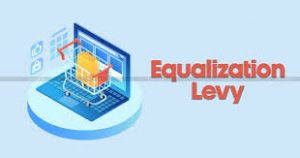Equalization Levy:

The central government has proposed to abolish the Equalisation Levy, or digital tax, on online advertisements, aiming to benefit advertisers on platforms like Google and Meta.
- The Equalisation Levy was introduced in India in 2016, with the intention of taxing the digital transactionse. the income accruing to foreign e-commerce companies from India.
- It is aimed at taxing business-to-business transactions.
- It is also often referred to as the “Google Tax”.
- It is a direct tax, which is withheld at the time of payment by the service recipient.
- The two conditions to be met to be liable to equalisation levy:
- The payment should be made to a non-resident service provider;
- The annual payment made to one service provider exceeds Rs.1,00,000 in one financial year.
- Currently, not all services are covered under the ambit of equalisation Levy. The following services are covered:
Online Advertisement Services (Effective from June 1, 2016). - Any provision for digital advertising space or facilities/services or selling goods to Indian residents, or users accessing services/goods through Indian IP addresses (Effective from April 1, 2020).
- It was also mentioned during the introduction of the levy that as and when any other services are notified, these will be included with the aforesaid services.
- Equalisation Levy Exclusion:
- The non-resident service provider has a permanent office in India, and the requested service is linked to that permanent office/establishment.
- The total consideration amount to be paid for the specific service payable or received is less than Rs.1 lakh.
- The service described is not intended to be used to pursue a profession or work.
- An exemption under section 10(50) of the Act is provided to avoid double taxation for any income arising from specified services provided on which equalisation levy is chargeable.
- An income chargeable to tax as fees or royalties for technical services will not be included as income for the equalisation levy purposes.
- The tax rate under the equalisation levy depends on the type of service or transaction.
- For specified digital services, such as online advertising, the rate is 6% of the gross consideration.
- For e-commerce transactions, such as online sale of goods or services, the rate is 2% of the gross consideration.




